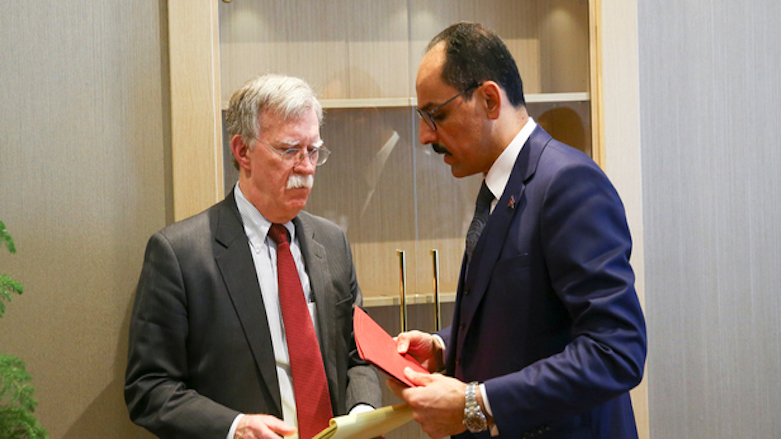Bolton in Turkey: US opposes mistreatment of Kurdish allies

WASHINGTON DC (Kurdistan 24) – Visiting Ankara on Tuesday, White House National Security Advisor John Bolton insisted that it was crucial that America’s Kurdish allies, who fought the Islamic State in Syria, are protected, after US forces leave Syria.
Bolton met Ibrahim Kalin, Special Advisor to Turkish President Recep Tayyip Erdogan, and “stuck by the President’s request that the Kurds, that the opposition forces that fought with us, not be mistreated,” a senior US official told Kurdistan 24.
National Security Council Spokesman Garret Marquis explained that Bolton had a “productive discussion” with Kalin about President Donald Trump’s “decision to withdraw at a proper pace from northeast Syria.”
The two advisers “identified further issues for dialogue and emphasized the strong bilateral relationship between the US and Turkey,” Marquis stated.
Gen. Joseph Dunford, Chairman of the Joint Chiefs of Staff, and Amb. James Jeffrey, Special Envoy for Syria Engagement, as well as Special Envoy to the Defeat-ISIS Coalition, joined Bolton in Ankara, and they remained there for continuing discussions, following Bolton’s departure.
“The US looks forward to the ongoing military-to-military consultations today on our cooperation in Syria,” Marquis added.
Erdogan, however, presented a very different view of Turkey’s discussions with the US, slamming remarks that Bolton made on Sunday, in which he affirmed that the withdrawal of US forces from Syria depended on a Turkish commitment not to attack America’s allies.
“Bolton’s remarks in Israel. It is not possible for me to swallow this,” Erdogan said on Tuesday. “Bolton made a serious mistake. If he thinks that way, he is very mistaken. We will not compromise.”
Among the points Bolton made in Ankara was that an opinion piece appearing Monday in The New York Times under Erdogan’s name was both wrong and offensive.
The op-ed suggested that Turkey would have done a better job than the US in fighting the Islamic State in Syria and in securing liberated areas subsequently. Had that really been so, the Obama administration, under which the fight against the Islamic State began, would have welcomed Turkey’s participation in combatting the terrorist organization, as would the Trump administration.
“We want to ensure that citizens do not feel disconnected from government,” Erdogan wrote in the Times, describing Ankara’s plans for political stability in Syria.
Aykan Erdemir, a former Turkish parliamentarian and now a Senior Fellow at the Foundation for the Defense of Democracies, remarked, “Tackling that challenge at home would be a good place to start.”
“Ensuring political representation for all communities is another priority,” Erdogan stated. “Under Turkey’s watch, Syrian territories that are under the control of the YPG [the Kurdish People’s Protection Units] or the so-called Islamic State will be governed by popularly elected councils.”
Ranj Alaaldin, of the Brookings Institution, noted that while Erdogan stressed a Turkish role in “overseeing good governance” in Syria, it is “a task Turkey is woefully unprepared for” unless done in cooperation with the US.
